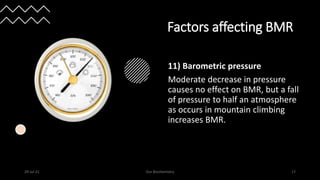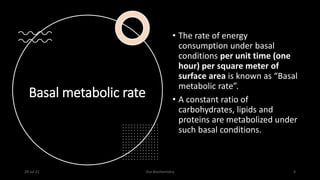Which of the Following Does Not Decrease Basal Metabolic Rate
All of the following factors increase basal metabolic rate EXCEPT. The difference is more marked in older age groups.

Basal Metabolic Rate An Overview Sciencedirect Topics
BMR aids to know the total amount of food or calories required to maintain body weight.

. The Effects Of Age. This decline in basal metabolic rate is associated with changes in body composition that also change with age such as loss of body protein and muscle mass and a change in fat distribution. It does not include activities such as walking to the bus washing.
NEAT is part of the physical activity component of total energy expenditure B. Your basal metabolic rate BMR is the amount of energy required for your body to perform its most basic functions for example breathing and pumping blood throughout the body. Starvation or fasting d.
The BMR of women undergoes change in relation to the menstrual cycle. It is more prior to and. Which of the following does not affect basal metabolic rate.
B A decrease in non-shivering thermogenesis when exposed to cold c An increase in basal metabolic rate that is not fully explained by a change in body composition during chronic overfeeding d A decrease in spontaneous physical activity during chronic overfeeding. EXAM 1 Question 1 2 out of 2 points Which of the following does NOT decrease the metabolic rate. Pages 3 This preview shows page 2 - 3 out of 3 pages.
The basal metabolic rate BMR is defined as the metabolic rate during rest but while the person is awake. The BMR is low in starvation under nutrition hypothalamic disorders Addisons disease and lipoid nephrosis. Basal metabolic rate BMR and Resting metabolic rate are both ways of assessing the calories used for your body to function.
Level of physical activity D. Course Title CBIO 111. The BMR is usually.
Which of the following animals would have the highest. Females have been found to have 2 to 12 less BMR than males. Fever Which of the following hormones is most responsible for signaling satiety as well as reducing food intake during a meal.
Even though there is a slight difference the term BMR is often used interchangeably with the term resting metabolic rate RMR which is the number of calories your body burns at rest. Elevated levels of thyroid hormone. Solution for Which of the following does NOT increase basal metabolic rate BMR.
Younger age O b. The BMR is greatest during first few years of life. The BMR is a more restrictive measurement of the energy your body uses for basic functions such as breathing blood circulation and organ functions.
The person should be in a postabsorptive state not having eaten within the last 12 hours. Cholecystokinin the major cause of insulin resistance is related to excess body weight. But its not just metabolic rate that declines with age.
The person should also not have strenuously exercised within the previous 12 hours. In severe hypothyroidism the BMR may be decreased to 40 to 50 percent below normal. Which of the following is true of nonexercise activity thermogenesis NEAT.
Lean body mass B. Later it gradually falls throughout the remaining life. Whereas the resting metabolic rate is your energy expenditure during a normal resting or non-exercising.
This loss of muscle mass is accelerated in over-65s and further still in situations such as sarcopenia. Which of the following factors does not increase basal metabolic rate. Added muscle mass c.
The factors affecting Basal Metobolic Rate BMR are as follows. Which of the following does not decrease the metabolic rate. School Clark Atlanta University.
Younger age O b. BMR 655 96 weight in kg 18 height in cm 47 age in years Men. It uncouples oxidative phosphorylation in mitochondria and reduces activity of shuttle molecules that transfer.
The air in the room should be comfortable with all sources of excitement removed. Thyroid hormone is a key driver of thermogenesis. Male sex O c.
BMR 66 137 weight in kg 5 height in cm 68 age in years Why you might want to know your BMR. Which of the following animals would have the highest basal metabolic rate. Thyroid hormone stimulates basal metabolic rate primarily by increasing ATP production for metabolic processes and by maintaining ion gradients NaK and Ca 2 which consume ATP.

Basal Metabolic Rate Bmr Factors Affecting Bmr Measurement And Cl

Basal Metabolic Rate Bmr Factors Affecting Bmr Measurement And Cl

Solved Question 41 Which Of The Following Statements Is True Chegg Com

Basal Metabolic Rate What Is It And Why It S Important Envision Fitness Blog
No comments for "Which of the Following Does Not Decrease Basal Metabolic Rate"
Post a Comment